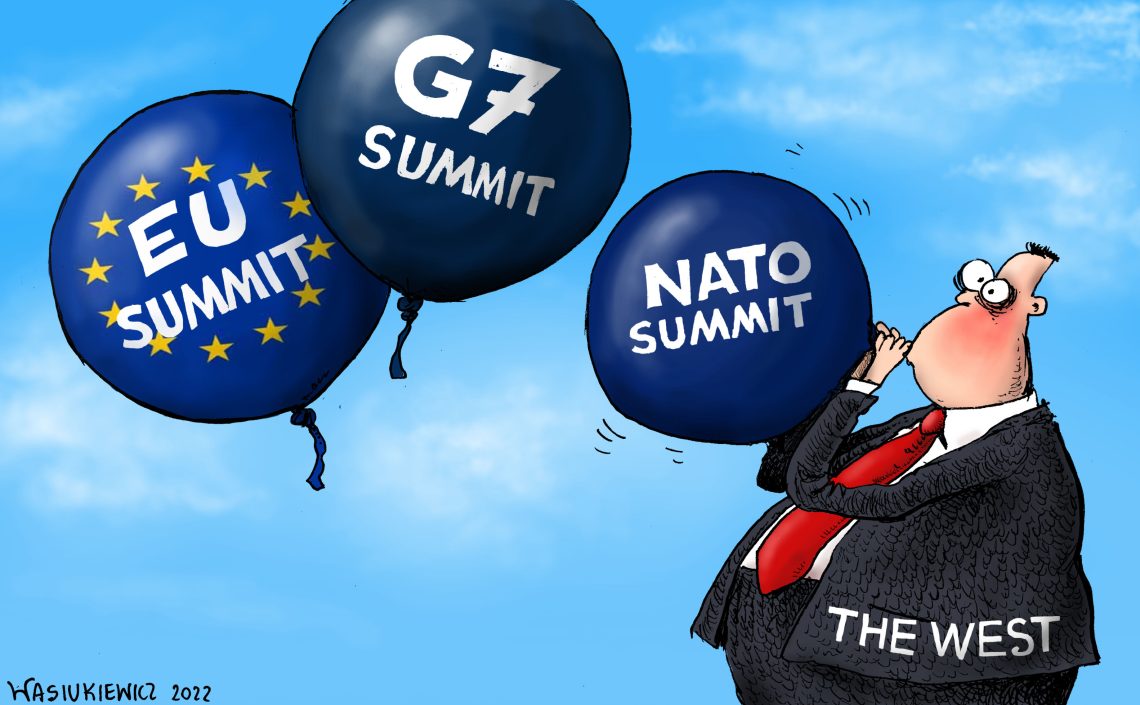Summits: A dearth of statesmanship
The West needs leadership from true statesmen, not summitting technocrats.

So-called world leaders love summits. These events give them global exposure in the media and create the illusion that something is being done. The summits’ costs – the staff, logistics, accommodation and security – are staggering, and valuable time is wasted. However, typically, these gatherings result in mediocre outcomes. It does not hurt when leaders can talk formally and informally, but this could be arranged more efficiently.
In the last few days, we witnessed no less than three summits: the European Union’s, the G7’s and NATO’s.
The EU meeting granted Ukraine and Moldova accession candidate status. This is an important signal, but the hard work – reforming Ukraine – remains mostly ahead. One can only hope that the Ukrainians’ capacity for heroism in defending their homeland from Russia will also manifest itself in a courageous internal transformation.
The summit’s throwback was a rebuke to the Western Balkans, especially Kosovo and North Macedonia. Accession for the entire area has been postponed indefinitely, which is particularly unfair toward North Macedonia. Its EU aspirations were long blocked by Greece, so the country made substantial concessions to satisfy Athens. And then, it was Bulgaria’s turn to veto its candidacy again – by demanding changes to the North Macedonian constitution. (Sofia questions Macedonian nationhood and considers the Macedonian language a Bulgarian dialect.)
What is needed is fewer grand announcements and more targeted program follow-ups and implementation.
The signal to the Western Balkans, where the interests of Western Europe, NATO, Turkey, and Russia overlap, is politically devastating. In the past, Serbia erected a similar roadblock concerning Kosovo. Geopolitically, the region is vital, and it would be a massive mistake for the EU to delay its accessions for much longer. It holds back progress in the Balkans and hurts Europe’s long-term interests. Aside from widening the inroad for Russia, the summit decision can also be a discouraging signal for Ukraine.
The outcome of the G7 summit in Elmau in the Bavarian Alps was as disappointing as expected, judging from the group’s other meetings in recent years. The talk of democracies showing unity in defense of the “rules-based world order” and rejection of violence was laudable. However, it seemed like a hedgehog’s reaction to the sound and sight of an approaching car: rolling himself into a spiky ball does not protect the poor animal from being squashed by the oncoming vehicle.
The participants agreed to create a $600 billion-worth program to counter the Chinese Belt and Road project. Such initiatives are worthwhile but should be implemented regardless of what China is doing. Merely responding to the Chinese will not help the West regain the upper hand in the geopolitical dynamic. Instead, what is needed is fewer grand announcements and more targeted program follow-ups and implementation.
In Elmau, the state leaders announced that sanctions against Russia should be more severe still and attempts should be made to cap the price of hydrocarbons to hurt Russian finances. However, experience shows that economic sanctions rarely succeed, and in the past, they left the Kremlin rather unimpressed. The G7 nations emphasized that they would do all within their means to help Ukraine. One can only hope that this will remain in focus.
The main topic of the NATO summit in Spain was Sweden and Finland’s membership. Turkey was heavily criticized for blocking this expansion for a while. However, Turkey happens to be the NATO member country most often attacked by terrorists. Ankara requested that the two candidate states fight terrorist groups targeting Turkey. Sweden was initially reluctant to accept this legitimate demand. It also displayed a certain tolerance – some would say sympathy – toward certain anti-Turkish activities.
Fortunately, NATO Secretary General Jens Stoltenberg understood Turkey – one of the organization’s most important, oldest and loyal members – and helped convince the two Nordic countries to change their attitude. Ankara dropped its opposition, which is undoubtedly a good thing on two accounts: it will strengthen the alliance and help fight international terrorism.
Another positive outcome of the June NATO conference is the decision to increase the size of its Response Force, high-readiness units meant to come to the aid of frontline states. The force will be boosted from some 40,000 to “well over 300,000,” according to Mr. Stoltenberg.
So indeed, some outcomes of these summits could lead, eventually, to positive results. But the feeling remains that it is somewhat disingenuous to announce successes only because some meetings have taken place. We are witnessing a labored muddling through problems rather than a display of inspired leadership.
The West is run by technocrats when it badly needs statesmanship.
